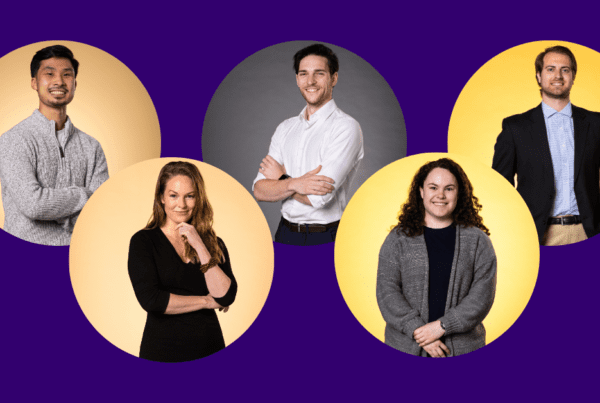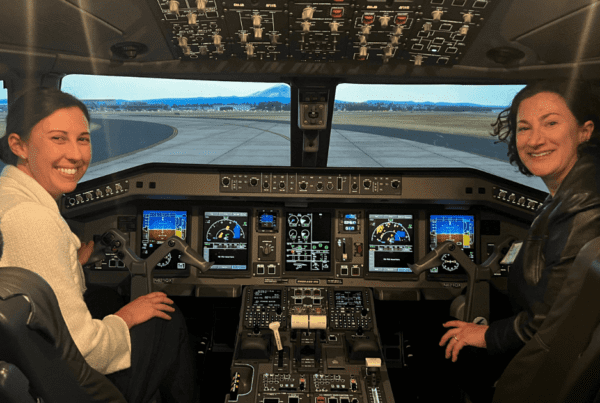Highlights | Capstones for community
- Master of Occupational Therapy Students complete a year-long community-based capstone project.
- The 2023 projects cover mental health, trauma-informed education practices and fall prevention.
April is Occupational Therapy month. Get to know the graduate students training to become occupational therapists and the work they are doing in our community.
Training in a collaborative community
Every year, twenty-four students are admitted as part of the two-year UW Master of Occupational Therapy program within the UW School of Medicine Department of Rehabilitation Medicine.
They complete rigorous academic coursework with fieldwork education to become occupational therapists, a profession that helps clients find ways to improve their ability to perform daily tasks. They learn how to create treatment plans, which can range from helping clients bathe and get dressed to mapping out how best to return to work, school or hobbies. Occupational therapists are also trained to help those who are experiencing memory loss, mental trauma or who need help with executive functioning skills.
Service learning
Students work in small teams on a year-long project with a community group and report on their project outcomes and scholarship. Their projects cover a range of issues, such as mental health, trauma-informed education practices and fall prevention. This year, six programs were developed and implemented.
“The capstone projects support our commitment to community engagement and service. They support student learning and leadership development, and foster practice innovations that broaden the reach of occupational therapy in our communities,” says Tracy Jirikowic, PhD, professor and program director for the Division of Occupational Therapy.
Occupational therapy projects benefit all ages from children to seniors
Occupational therapy can help people of all ages improve their quality of life by giving them the tools to perform a variety of daily activities. Learn about the community-based projects led by occupational therapy students.
Improving quality of life for hospice patients
Jenny Gonser and her group are working with Providence Sound Hospice to determine how best to measure the value that occupational therapists provide to hospice patients. While occupational therapists in hospice settings are a newer area of practice, she notes that hospice patients can benefit from occupational therapists’ focus on quality of life.
“Patients who are at the end of life are often neglected and not given opportunities to continue to be engaged in simple things like going outside or making social connections,” says Gonser.
Working with students with disabilities
Kiyomi Mozley and her cohort work with high school students with mild to moderate intellectual disabilities in the Highline Public School District. They teach students about alternative career paths that have not been traditionally encouraged. Mozley describes how they have helped high school students explore what it would be like to work at a coffee shop, perform office or technology related jobs and plant gardens by simulating these work environments.
She notes that the biggest takeaway has been learning to adapt lesson plans to the needs and interests of the students.
Communicating with community centers
Lizzie Willsmore-Finkle’s group is collaborating with three community centers serving adults who have intellectual or developmental disabilities and/or a diagnosis of autism. Her group developed staff training on how to productively engage with clients who have a communication challenge. In particular, the staff are learning how to work with clients to effectively address mental health concerns before they reach crisis level.
“The staff has been really receptive to our engagement with them as there has been a shortage of resources, especially since the pandemic,” says Willsmore-Finkle.
Supporting survivors of domestic violence
New Beginnings is another community partner that Tiffani Teng and her group are partnering with to help survivors of domestic violence with parenting skills. They organize and lead parenting group sessions on topics like regulating emotions and mindfulness as well as activity-based routines such as developing a sleep routine for children.
Teng says having occupational therapists work with survivors of domestic violence is another area of emerging practice and she has found it rewarding to see clients willing to engage and learn new parenting tools.
Preventing falls for older adults
Alyssa Arian’s cohort is working with older adults at Horizon House, a senior living community, to develop a more evidenced-based, robust fall prevention program. They are focused on the importance of measuring the many risk factors that can contribute to falls such as medication use, nutrition, sleep and appropriate footwear, and have developed a survey to capture this data. She says she’s been impressed with this population’s autonomy and is excited to help Horizon House deepen their fall prevention efforts in the community.
Working with community mental health partners
The final project group worked with Downtown Emergency Service Center (DESC) which is a multi-service agency that provides housing, emergency shelter, crisis intervention, and integrated behavioral health and healthcare services to thousands of unsheltered and formerly unsheltered people every day. Occupational therapy students work with DESC occupational therapists to develop a client centered assessment form as well as a referral for occupational therapy services intended to meet the needs of this population.
Celebrating partnerships and projects
Jirikowic says the capstone projects are well-received by community partners and allow students to gain practical experience with clients, learn about different career paths within occupational therapy and make a difference in the community.
Students will present their capstone projects in June at their graduate symposium to the community, family and friends.


